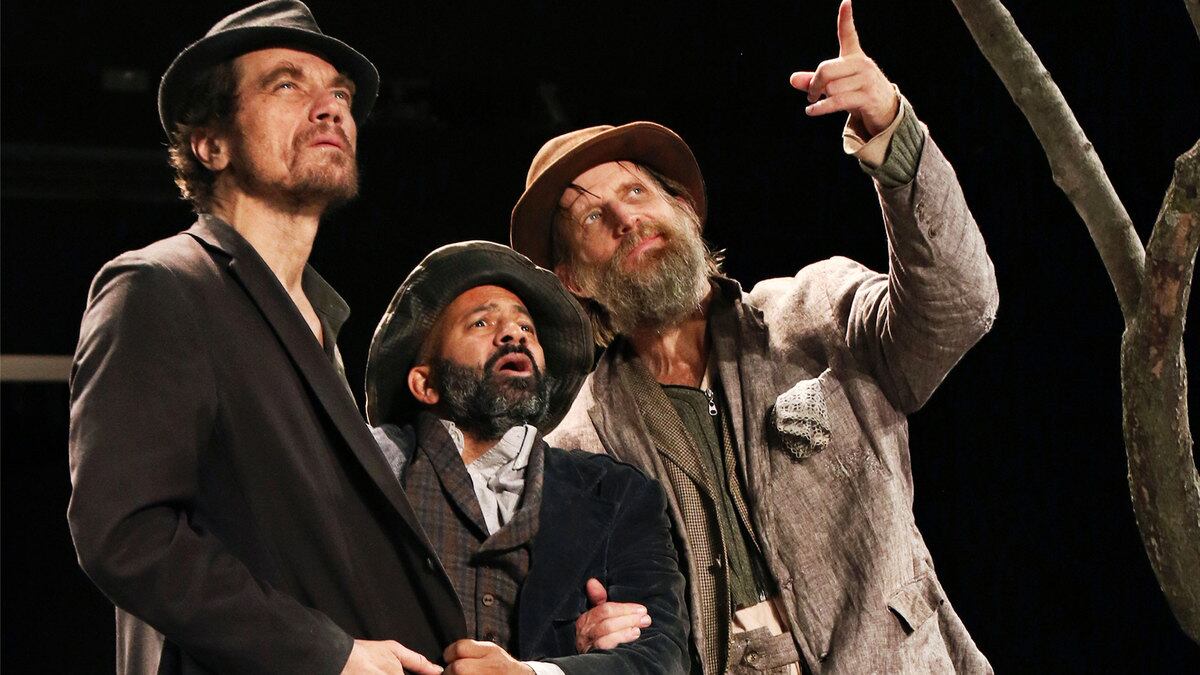How refreshing for a play where famously not much happens in an exercise—as its title implies—of eternal futility to spend two-and-a-half hours with such a sparky, entertaining Vladimir (Paul Sparks) and Estragon (Michael Shannon), as they grizzle and come to peaceable terms with their open-air trap of cohabitation and co-dependency.
Part of the success of this witty, riveting, physical comedy-filled adaptation of Samuel Beckett’s play at Theatre for a New Audience in Brooklyn (TFANA, to Dec. 3), directed with corresponding intelligence and wit by Arin Arbus, is in its notion and use of space and light. Estragon opens the play in ongoing battle with his immovable shoe (“Nothing to be done”), and in other productions he and Didi are very literally constrained in their perpetual limbo, with directors underlining the point of their confinement in simple physical terms of their not being able to move much.
Here, designer Riccardo Hernández and Arbus elect to give Sparks and Shannon an entire stage to clown and play on. It doesn’t stray to extra furnishings; Beckett’s staple tree that eventually, mysteriously sprouts leaves, still stands alone in terms of adornment. Beckett laid out Act One as “A country road. A tree. Evening.” And Act Two as “Next day. Same time. Same place,” then had his characters undermine that basic timeframe with questioning what happens on the first day that we see.
This production’s innovation is to make Didi and Gogo’s road to somewhere-they-never-go into an energy- and activity-filled playground, a yellow median line painted down the middle. That road goes in a vertical from one end of the theater to the other, and its narrow expanse is inventively used by actors and director, and lit evocatively for unsparing day and cloaking night by Christopher Akerlind. Characters run off this stage, disappearing with clattering bangs and sounds into the unseen, unknown world beyond. We feel they can leave here, but they keep coming back—and they keep coming back together. As Didi tells Gogo, “You’re my only hope.”
Dressed in tattered-to-almost-destruction suits (by Susan Hilferty), the wonderful Shannon plays Estragon with an attractively brooding, taciturn, low-energy bafflement, while Sparks lives up to his surname with a Vladimir who is a beguiling spinning wheel of bodily tics and movement. Into their lives come Pozzo (a bracingly bumptious Ajay Naidu) and his be-roped charge Lucky (Jeff Biehl).

Michael Shannon as Estragon, left, and Paul Sparks as Vladimir in 'Waiting for Godot' at TFANA.
Hollis KingBut who is truly dominant in that relationship becomes muddied. We see it in how Pozzo ultimately grasps for the rope, and finally his own deep practical and emotional need for whatever Lucky offers him. The latter’s famous, free-flowing philosophical speech gets its own round of applause before his beatifically smiling silence assails him again. Encapsulating the poles of comedy and tragedy in the play itself, Pozzo says Lucky has taught him that “The tears of the world are a constant quantity. For each one who begins to weep somewhere else another stops. The same is true of the laugh.”
In this Godot, we see Vladimir and Estragon—moving their bodies at moments in meaningful, touching unison—watch these interlopers with a keen, almost investigative interest as if psychologically mapping what might become of them in time if Godot never arrives, and if they never get to leave this space. Are Pozzo and Lucky their destiny, and do they want to emulate that or avoid what seems at least initially like an unequal, abusive pairing? Far better to have their more equable bond, where the act of eating turnips and carrots becomes just as funny as anything Laurel and Hardy dreamt up—the most famous Vladimir and Estragon of the silver screen.
The pacing and acting within this excellent production is so well thought out, even in the text’s most opaque spaces. It doesn’t make Beckett fully legible and intelligible, but it makes a clarifying, interpretive sense of the absurdity and mystery of the men’s situation.

(l to r): Michael Shannon as Estragon, Paul Sparks as Vladimir, Ajay Naidu as Pozzo, and Jeff Biehl as Lucky in 'Waiting for Godot' at TFANA.
Hollis KingThe second act retains its strangeness, as the things the men experienced in the first act return or re-emerge the day after. Except... it may not be the day after—and if it isn’t then where are we and where are they, and when is what is happening in front of us actually happening, and if it is happening who is experiencing it? Even in the first act there is confusion if the men were here the day before.
A sweetly poised Toussaint Francois Battiste as the little boy who enters to tell them of Godot’s imminent arrival says he wasn’t the same boy the men saw on day one. When Pozzo and Lucky reappear on day two Pozzo is radically changed. What could have happened to him? The tree has suddenly acquired those leaves.
The restatement of “Waiting for Godot” as Vladimir and Estragon’s mission at first seems silly, even for them—but towards the end of the play it feels a comfort and anchor. They could part if Estragon thinks it better, Vladimir says near the end. “It’s not worthwhile now,” Estragon replies gently.
Even as they finally resolve to “go,” in this Godot—as in every Godot—Shannon and Sparks remain stuck in the perennial purgatory that follows the utterance of that final line. However, this production comes with the cushion of comforting companionship its two lead actors skillfully conjure and convey. It’s a rare production that you want to carry on waiting for Godot with Didi and Gogo, but this is one.






